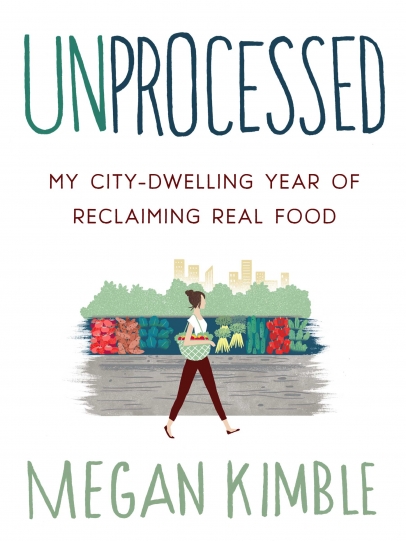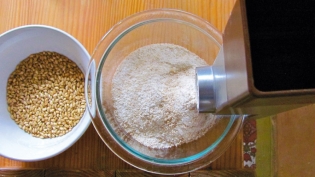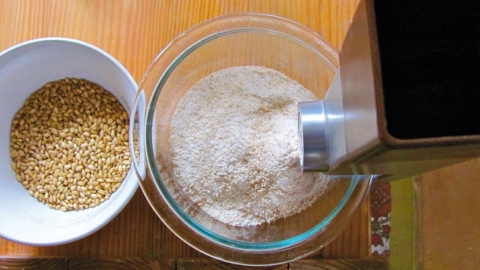Unprocessed: An Interview with Megan Kimble
Interview by Gary Paul Nabhan
While the amount of reportage on local food production and procurement has increased exponentially over the last two decades, the amount of elegant, compelling, and memorable prose about food has not. Megan has an MFA in creative writing from the University of Arizona, as well as years of experience as a working journalist; as she interviews a range of farmers, ranchers, millers, wine makers, and beekeepers, she coaxes out of her interviewees original, honest information about their lives and livelihoods, while at the same time embedding them into a literary narrative as cohesive as a good novel. As managing editor of Edible Baja Arizona, Megan has already become a voice in the food world that thought leaders are seeking out to move our conversations in new and unforeseen directions. In Unprocessed, Megan Kimble is sure to raise the bar for literary food writing one more notch, while engaging many in new explorations of how the raw becomes cooked, why whole foods matter, and, not least of all, how the money we spend shapes our communities.
—Gary Paul Nabhan
Why did you write this book?
I’m not entirely sure why I stopped eating processed food. There was the environment—I’d come of age in an era when global warming was all but assumed, when natural resources were suddenly scarce and our food system increasingly dependent on fossil fuels. There were political reasons, as I considered the enormous influence food companies wield in our national politics. And there were economic reasons—I wanted to spend what little money I earned endorsing my local food system, one that I hoped was visible, accountable, and scalable. I was also broke, tired of reading about what I should do. I wanted, instead, to explore what I could do, given limited resources of money and time.
I also happen to love process—how this becomes that, and how that gets from there to here. It’s why I got into journalism—to figure out how the world works, unseen and assumed. I love digging into the seemingly simple questions of our food system. How does a melon get from the soil in Sonora to a Safeway supermarket? How does muscle become meat? These are no longer simple questions with simple answers and I wrote Unprocessed to start to untangle these networks and to understand how I might sustain myself just a little closer to home.
You touch on this in the epilogue, but how has your long-term relationship with food changed because of your year of reclaiming real food?
I eat better food. Better for me, but also better tasting. I eat real foods, so I’m usually full. Like so many women—and men—I’d struggled with my weight for years. Eating unprocessed taught me, finally, how to eat real food in moderate amounts—and how to do it without guilt or restriction, but with joy and communion.
More than three years later, I still eat about 90 percent unprocessed. It’s nice, though, to be able to venture out on a Friday night and have a Sonoran hot dog, if that’s what the night calls for. To celebrate birthdays with friends and cake, or holidays with family and Grandma’s stuffing recipe. My year of reclaiming real food taught me how important food is for our bodies, communities, and landscapes, but it also taught me the importance of relationships—and how, sometimes, it’s as much about the food as who you’re eating it with.
How did living in a desert city influence your city-dwelling year?
I was lucky to live in the sunny Southwest—my Community Supported Agriculture program runs year-round, so there was always fresh, local food. I ventured briefly into canning during summer’s bounty, but I would have had to be much more creative with food preservation if I lived somewhere like Minneapolis or New York City.
Because unprocessing my food meant finding sustenance closer to home, the Sonoran desert was an essential part of my year. I learned about the heritage foods of this place, foods that people have grown and cooked here for centuries. One advantage to seeking out place-based foods is that they connect us to our communities, introducing us not only to the flavors of a place, but also to the people that are growing, processing, and preparing these foods.
So much food writing today is dismissed as self-righteously holier-than-thou in its stance. What values allowed you to avoid that trap?
It was as much about circumstance as values—when I stopped eating processed food, I was busy, broke, and living in a tiny apartment with a janky, understocked kitchen. From the outset, one of my goals was to show that eating whole, unprocessed food would not cost significantly more money—and that preparing that food would not take significantly more time.
What we eat matters, and so I understand how easy it is to climb on a soapbox, to become self-righteous about what other people are eating. But what we eat is also a very complicated thing, influenced by how we grew up and where we live and how much we weigh—and earn. People often ask me, what makes food processed? And I spend a lot of time in the book trying to answer that very question. But I also think that we each have to answer that question ourselves, to find out where it makes sense to draw the line. Given constraints of time, taste, and income, what makes food too processed for you?
You have worked as a bread-and-butter journalist, but also hold an MFA from the University of Arizona in creative writing and nonfiction. How do you balance those two sensibilities in the book?
When I started writing Unprocessed, I had read what many of us have read—how destructive factory farming is to our soils; how terrible industrial food is for our bodies; how inequitably our resources are distributed. But what I continued to struggle with was: So what then? Given what we know, how do we live? How can we, collectively and individually, create solutions and make change? Answering these kinds of questions required the sensibility of an essayist more than a journalist, and so I was grateful to my years in the MFA program that taught me not only how to write—how to ask big questions and make words into sentences into attempts at answers—but also why we write.
How did you conduct your research?
Initially, eating unprocessed appealed to me because it was something quiet and personal I could do, on my own terms and in my own kitchen, without inflicting yet another dietary restriction upon the world. But as I quickly realized how little I knew about how plants, animals, and minerals become food, I ventured out into my community to figure out the answers. I didn’t know how wheat became bread, so I interviewed a miller. I researched supermarkets, visited with beekeepers, brewers, and vintners, and evaporated salt from the sea. I was raised by two vegetarians, so, to reckon with meat, I slaughtered, butchered, and processed a sheep. Unprocessed emerged through the accumulation of experiences as much as through the aggregation of research.
What experience during your year unprocessed makes you laugh with horror or disbelief when you look back on it?
I accidentally went on a date with a fellow who didn’t believe global warming was “a thing.” As it turns out, that’s a deal breaker.
Unprocessed: My City-Dwelling Year of Reclaiming Real Food by Megan Kimble, (Harper Collins, 2015) .
Appeals to: DIY'ers, Edible fans, Local eaters,Thinkers.







